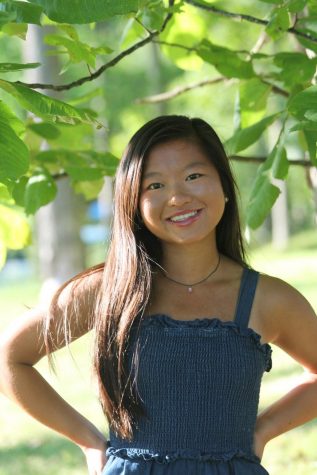A Closer Look at Netflix’s “Never Have I Ever”
Maitreyi Ramakrishnan plays the lead role in “Never Have I Ever,” Devi, an overachieving high school sophomore with a short fuse that gets her into difficult situations.
October 29, 2021
The South Asian community was taken by storm when Mindy Kaling announced her Netflix show “Never Have I Ever” in March 2020. While the trailers made it seem like another high school comedy, the show features Devi Vishwakumar, an Indian-American female protagonist that is rarely seen in Hollywood. While dealing with the everyday teen angst, boy drama, and peer pressure, Devi also struggles with grief, cultural identity, and acceptance.
“Never Have I Ever” highlights the fact that there is no set way to grieve and that grief presents itself differently depending on the cultural context. Devi deals with her dad’s death by projecting her anger towards different situations and people. She’s in denial of the fact this great loss is affecting her and refuses to face it until it starts hurting other relationships in her life. Devi’s mother, Nalini, copes by putting up a strong front. Although she accepts Devi using Western grieving methods, Nalini does not wish to deal with her grief in the same way. This cultural difference in grieving is depicted in one of the show’s most iconic scenes, when Devi’s therapist says, “I didn’t think you were someone who believed in therapy,” and Nalini responds with, “I don’t. It’s for white people.” By portraying these different forms of grief, “Never Have I Ever” shows that grief can be a very individual and cultural process.
While tackling the topic of grief, “Never Have I Ever” also takes on the topic of cultural identity. As an Indian-American, Devi feels the pressures of having to be a perfect Hindu daughter at home and a normal American teenager at school. The second she seems “too Indian” at school, she and her friends get called the UN. The reluctance towards cultural acceptance is most apparent in the episode, “Never have I ever…felt super Indian.” In the episode, Devi and her family spend the day celebrating Ganesh Puja. A day full of Indian traditions in a place where Devi can potentially be seen by non-Indians is not exactly her cup of tea. She spends her time complaining until she runs into an old family friend, Harish, who has just gone off to college. Prior to college, Harish was an “insecure Indian” just like Devi. Now, college has shown him that there is no reason not to embrace his identity, which gets Devi to rethink her college plans of becoming atheist, eating cheeseburgers, and finding a white boyfriend. College is all about finding an identity that is unique to your background and experiences.
In addition to telling the story of an Indian-American girl, “Never Have I Ever” has layers upon diversity. With a Japanese-American love interest, a Jewish rival, and two best friends who are Chinese-American and African-American, the show is truly representative. “Never Have I Ever” is relatable to Indian-American women and other women of color who haven’t had the chance to see themselves or their culture represented on screen. It’s a refreshing story that has helped widen the path for narratives that depict non-white experiences.


